Drywall is an essential part of any home. You can use it for functional items such as shelving and insulation. It can also serve as decorative pieces like wainscoting and fireplaces. There are hundreds of types of drywall to choose from, ranging in thickness and price.
As you can see, you could use 1/2 or 5/8 inches of drywall for any construction job. However, remember that only one may be better for a specific application.
If you consider adding some drywall to your next project, stick with this post. You might wonder whether of them is the better option. So, before we get into specifics, let’s look at both choices!
As far as drywall goes, 5/8″ is the best thickness to go with. It can withstand high temperatures and lasts long. It is also ideal because of its fireproof and soundproof qualities. On the other hand, 1/2″ is the best drywall when mounting a ceiling. This is because it has reduced costs and a lighter load, implying less work.
What Is a Drywall?
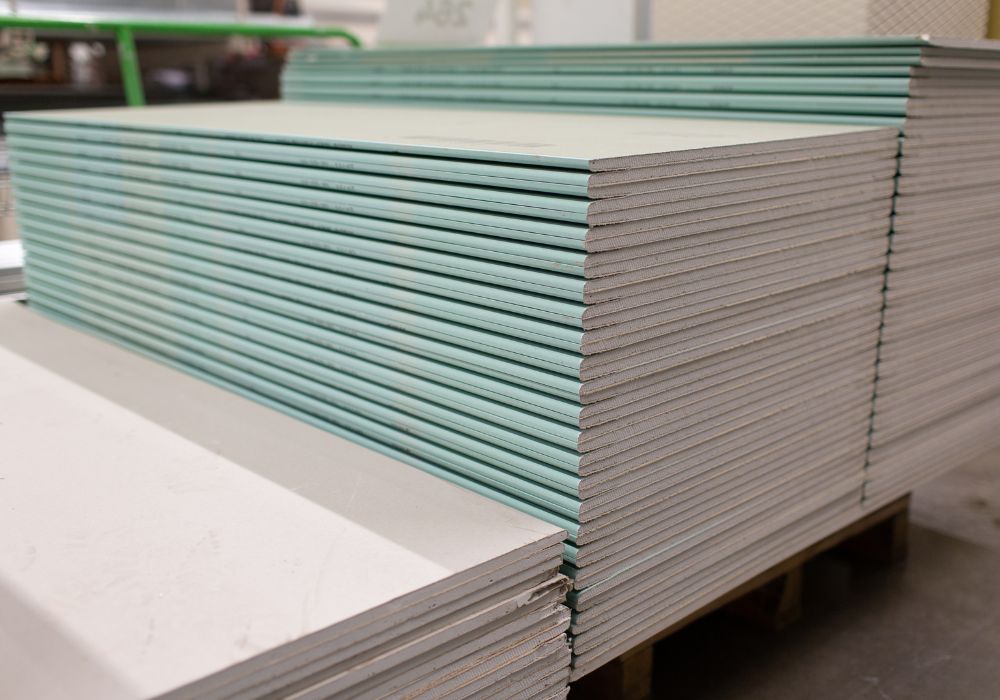
Drywall is commonly known as wallboard. It is a finishing material used in construction to cover the inside walls of homes and buildings.
Using drywall allows you to achieve the structural minimum bracing necessary. This is to resist lateral forces from wind and earthquake forces. Drywall produces this resistive effect and keeps the wall’s joists from collapsing.
What Is 1/2″ Drywall?
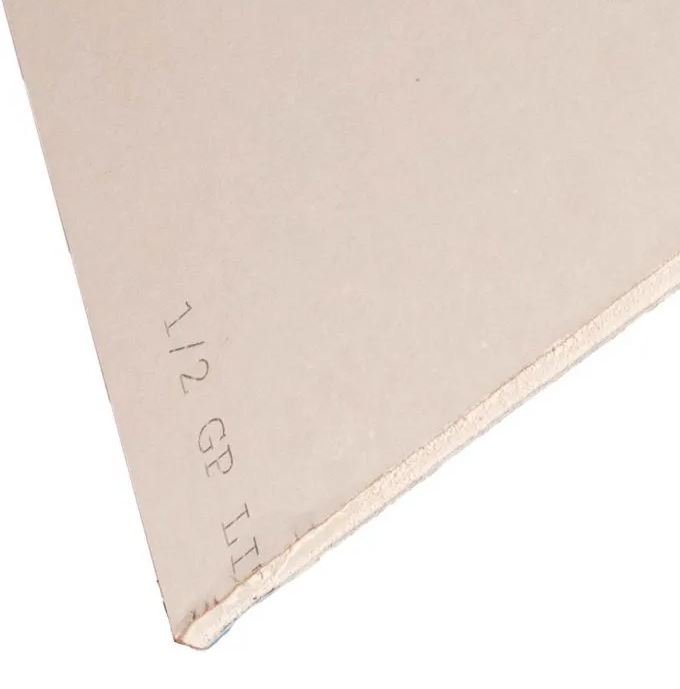
1/2″ drywall is the industry standard used for its durability and insulation.
They are the material of choice for most indoor walls. It is because they are lightweight and simple to install. Half-inch ultralight drywall is a good option if you’re worried about weight.
You can also select several panel sizes for this drywall thickness. It is a common drywall found in most homes for ceilings. These drywall sheets are also suitable for usage in metal or wooden frameworks.
Remember that 1/2″ drywall ceiling panels work best with 16-inch ceiling joists. Nails or screws every 7-12″ to prevent drooping.
What Is the Actual Thickness Of 1/2 Inch Drywall?
The actual thickness of this drywall is 1/2 inch or 12.7mm broad.
1/2″ drywalls come in a width of 4 feet and a length of 8 feet. Sheets of drywall measuring 4 feet by 8 feet, with a thickness of 1/2 inch, weigh 57 pounds. This makes them heavy for most DIYers to move and install.
The standard for ceiling framework is 24 inches. So using regular 1/2-inch drywall has always been fine. However, in most cases, you may also get 1/2′ panels in lengths of up to 16 feet. Longer lengths mean fewer butted seams, often referred to as butt joints.
What Is 5/8″ Drywall?
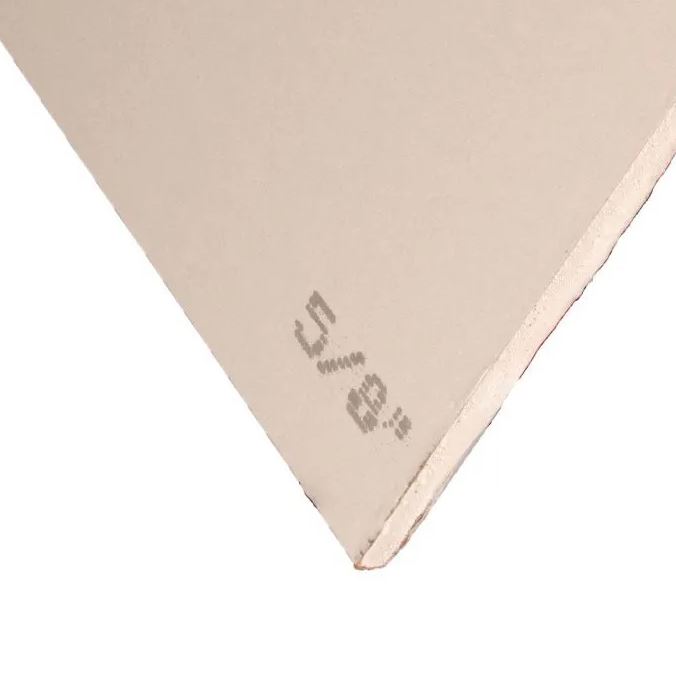
5/8″ drywall is a gypsum wallboard that is part of a larger structure for a wall.
It is often called the fire-code drywall. Therefore, it should meet the building’s fire resistance rating.
The fire-code drywall boasts a wall fire rating of 1 hour. On the other hand, the standard for 1/2″ drywall is at least 30 minutes.
If you have a choice, you should always go with 5/8. This is because the things you mount on it will be more stable, quieter, and securely fastened. Thanks to its increased stiffness and soundproofing.
Overall, it is ideal for reducing background noise in busy spaces.
What Is the Actual Thickness Of 5/8 Inch Drywall?
The actual thickness of this drywall is 5/8 inches or 15.9mm broad.
This drywall is the thickest available and is common in industrial & business settings. 5/8″ drywall is commonly referred to as Type X or C or Firewall due to its high level of protection against fire and noise.
In most cases, 5/8″ drywall sheets come in widths and lengths multiples of 4 feet.
8 Main Differences Between 1/2” And 5/8” Drywall
Now that we have the size and thickness, we can compare them and highlight the key distinctions.
1. Cost Difference
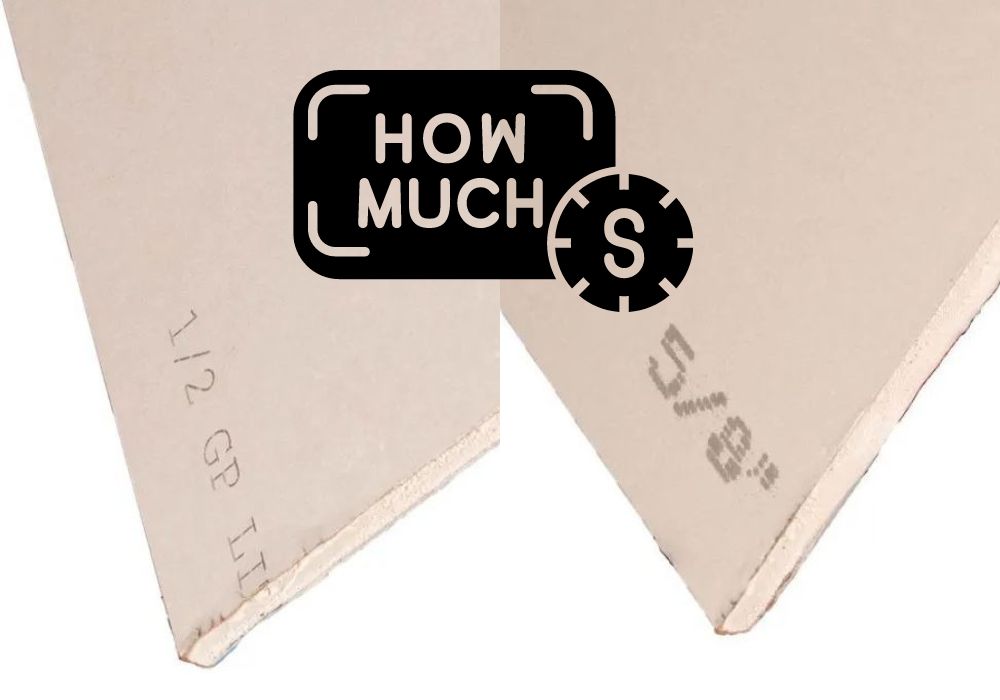
5/8″ drywall typically costs a bit more, and most installers will charge a bit more—probably around 15% higher.
Generally, the lengths of the sheets range from 8 to 16 feet, and they are 4 feet broad. However, it can be available in a range of thicknesses, from 1/2 to 5/8″. Here are the standard costs per square foot:
- Standard 1/2″: $0.30 to $0.37 per sqft.
- Standard 5/8″: $0.34 to $0.41 per sqft.
For example:
The difference in price between 1/2-inch and 5/8-inch wallboard for a 3000 sq. ft. home is almost $330.
2. Commonly Used Applications
1/2″ drywall panels are typically used for interior walls and ceilings. Homeowners use this in residential, repair, and remodel construction.
In two-story homes, 5/8″ drywall is sometimes used as a fire barrier and on the basement ceiling.
If you are remodeling for a family member, you can utilize 1/2 inch on the walls and ceiling. Meanwhile, use 5/8 inch in the wood shop or commercial spaces because it is fireproof and quieter.
In the US, building codes suggest that the walls must be 1/2-inch drywall. However, you could probably double up 5/8″ drywall, but it would be more work.
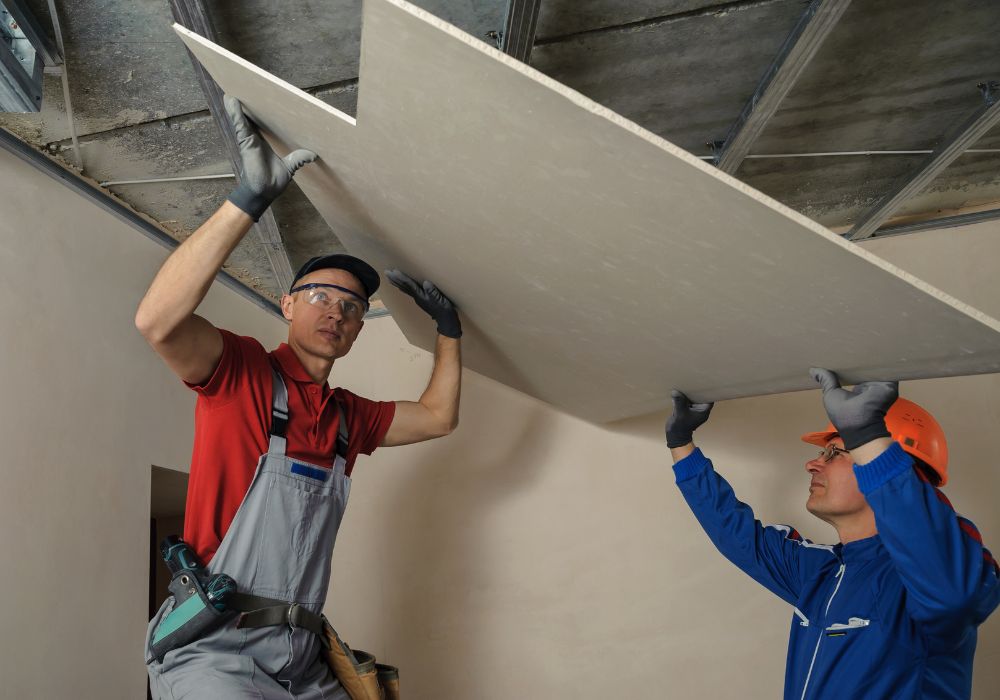
3. Sound Isolation
To lessen the “noise” by half, you need a reduction of 10 dB; to reduce it by 75%, 20 dB.
An increase from an average STC of 34 to an exceptional STC of 64 results in a 30 dB transmission loss.
In that case, 5/8″ drywall insulation on both sides is the most frequent type for soundproofing. They have an STC value of 34.
On the other hand, STC ratings of about 33 are typical for 1/2″ drywall. That is why it is only common for home interior walls.
Overall, the extra thickness of 5/8″ makes for a far more effective soundproofing material.
4. Weight
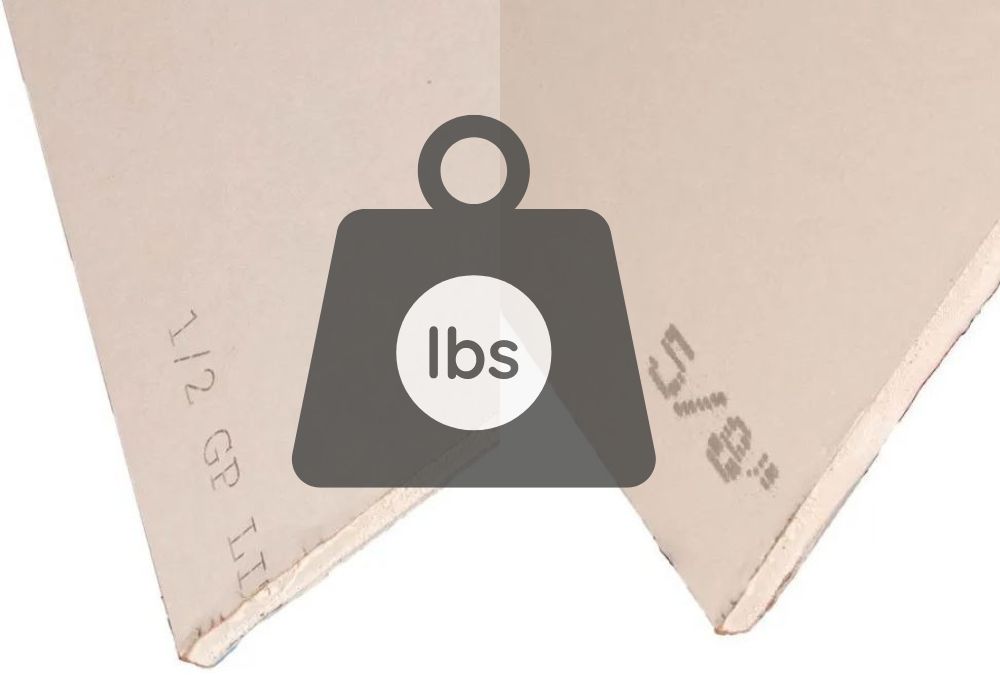
A standard, 4′ x 8′, 1/2-inch drywall sheet weighs slightly over 51 pounds.
At the same time, 5/8″ drywall typically weighs between 52 and 56 pounds per sheet. However, drywall weight can change by as much as a pound, depending on brand and type.
There is also lightweight drywall of 1/2″, but it only weighs about 39 pounds, a savings of about 12 pounds.
Therefore, 1/2-inch gypsum boards are versatile in both commercial and domestic settings. Thanks to their low weight and high adaptability.
5. Durability
Generally, the 1/2″ drywall strikes a good mix between cost and durability/insulation.
Meanwhile, in terms of increased stiffness, you should always go with 5/8.
Take the insulation’s weight into account:
Remember that 1/2-inch drywall can sustain 1.6 pounds per square foot (psf), whereas 1/2-inch ceiling bd can support 2.2 psf.
At the same time, the maximum working load for 5/8 in. drywall is 130 pounds, making it stronger.
1/2″ drywall is the standard in home construction. However, because it is so easy to punch holes, it needs to be stronger to hold much weight.
6. Can It Be Used For Ceiling?
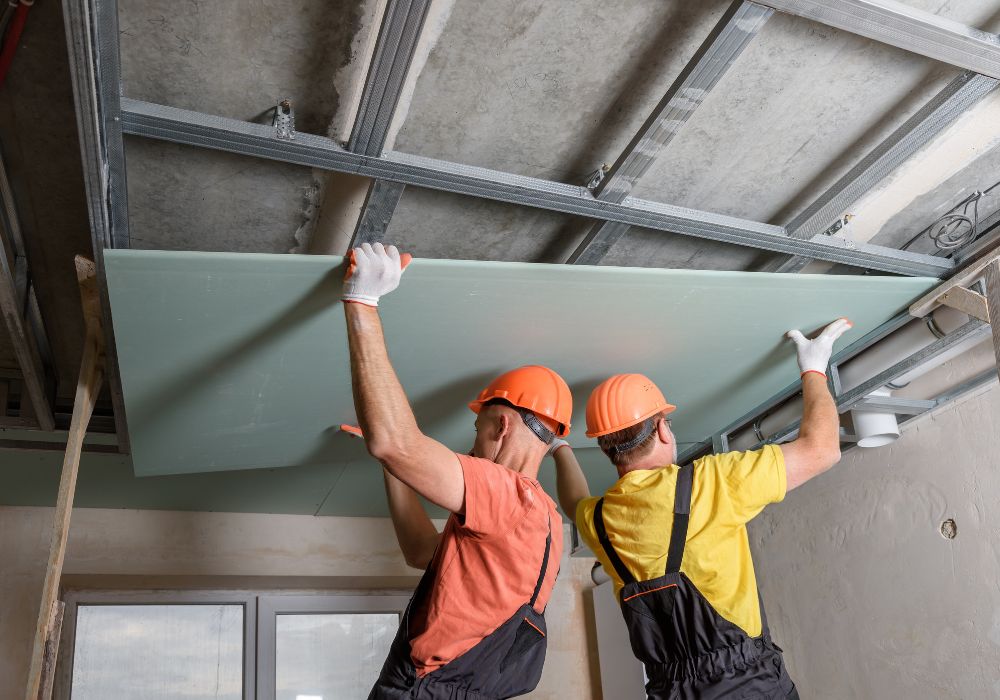
1/2″ drywall is usually your best option if you need something for your ceiling.
In most cases, there are situations where a thicker drywall is necessary. But 1/2″ will be acceptable even for fire regulations.
On the downside, using 5/8 on ceilings that you frame on 16″ or 12″ centers can cause problems. The 5/8 can break at any low joist, as the material won’t flex under any circumstances.
You can easily shape an irregular frame using 1/2″ drywall. Remember that 5/8″ has less of a propensity to be wavy.
7. Insulation Variations
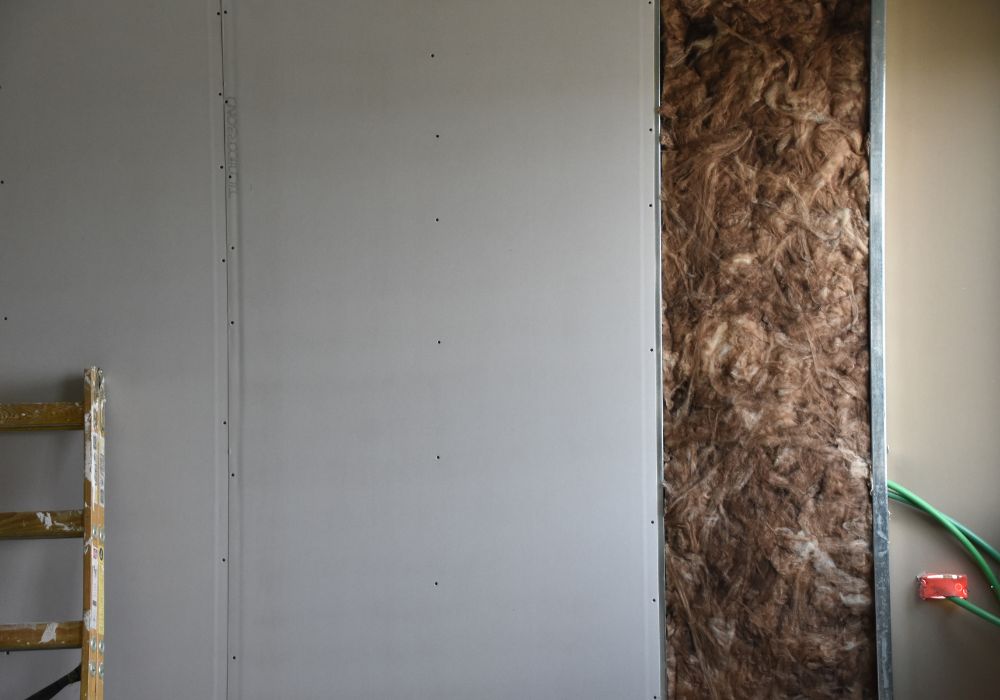
When measured at a thickness of 1/2″, the R-value of drywall is just about 0.45. But compared to other conventional insulation materials, it is pretty cheap.
1/2″ drywall is still ideal for construction and DIY home renovations.
On the other hand, because of the added thickness of 5/8″ drywall, it has far better insulation and sound barrier.
8. Fire And Water Resistance
All drywalls generally have a high degree of protection against fire. They don’t catch fire immediately when exposed to flames.
As mentioned earlier, 1/2″ drywall has a 30-minute fire rating.
Whereas the type X, 5/8″ drywall raises a wall’s fire rating to at least 1 hour, it proves that 5/8″ drywall has better fire resistance features.
Overall, both types of drywall panels can withstand moderate moisture. As a result, both are excellent choices for bathroom walls and other damp locations.
Which Drywall Is Better: 1/2” or 5/8”?
When selecting drywall, the best option is the 5/8 “.
It is fireproof and provides superior noise insulation that lasts for a long time. At the same time, when installing drywall for a ceiling, use 1/2 “. It is less expensive and weighs less.
Either way, it’s almost impossible to say that one is better than the other. Since it all depends on your needs and what you plan to use it for. Both are water-resistant and insulating, allowing you to make the most of your space.
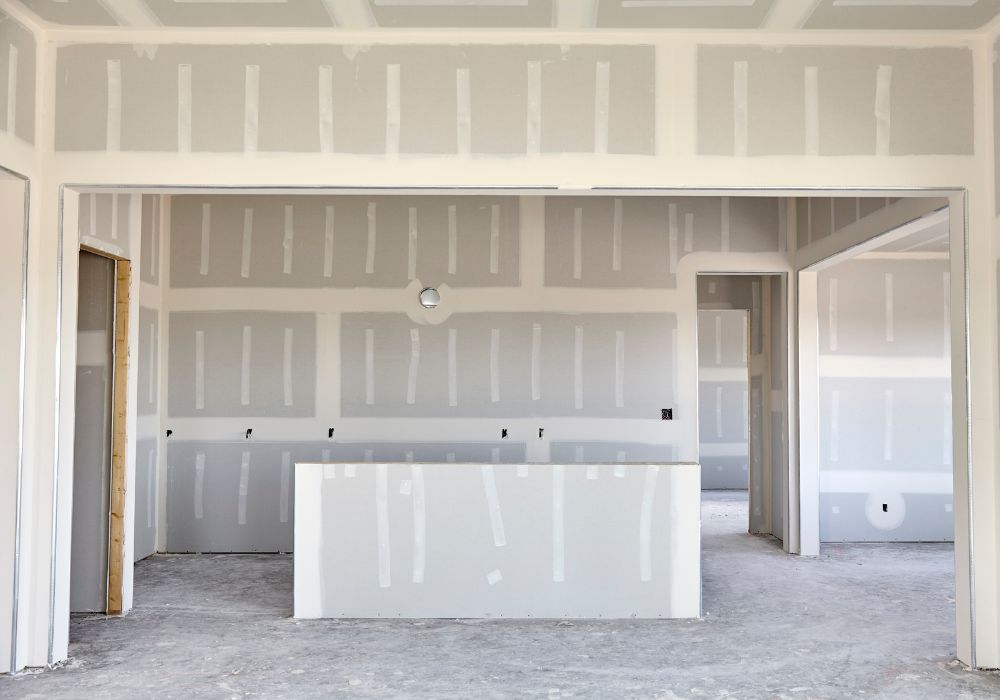
Generally, drywall has been the material of choice for all homeowners. This is because of its superior ability to absorb water and provide insulation. In addition, having drywall up around the house helps keep the heat in during the winter. At the same time, it provides in delivering cool air in the summer.
Whichever drywall you choose, both 1/2″ and 5/8″ offer these benefits. However, considering renovation, you should talk to your contractor first.
Ultimately, consider your budget and time limitations. And the overall look of your room when making your decision.
Read Also
Is Hardiebacker The Same As Wonderboard?
Are Durock And Hardiebacker The Same Thing?
How Long Should Drywall Screws Be For 1/2 Inch Drywall?
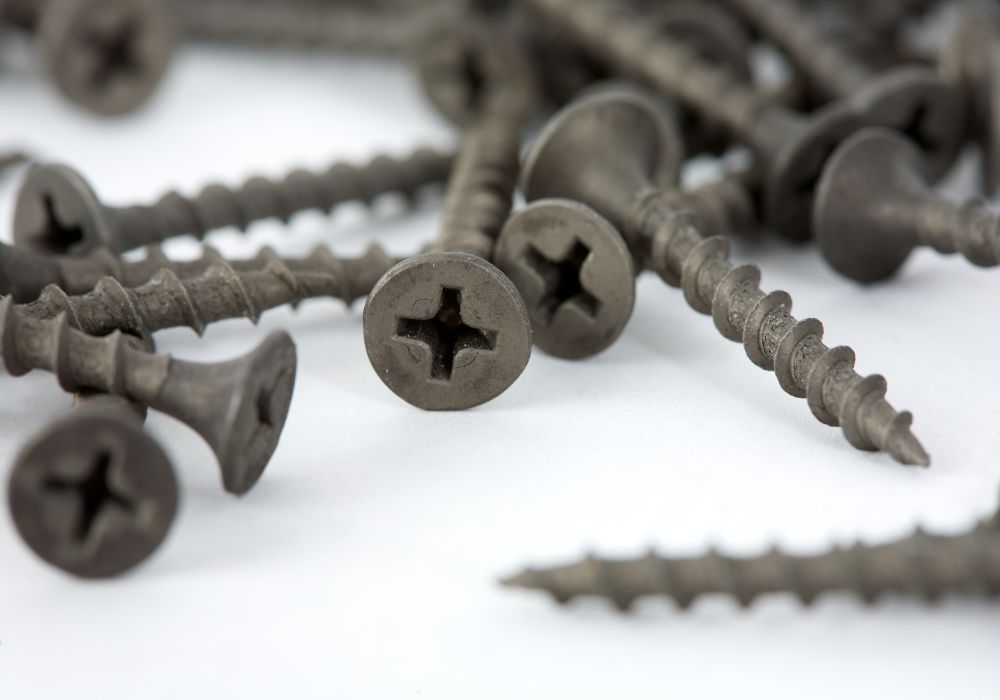
Anchoring 1/2′′ drywall requires screws no longer than 1/4″.
Use wide-head nails at least 1 1/2 times as long as the drywall’s thickness when working with wood studs.
Shorten the length of the screws if you’re using metal studs. 1 inch longer than the drywall’s thickness is necessary for the screw.
How Long Should Drywall Screws Be For 5/8 Inch Drywall?
Use #6 screws to anchor the additional load of 5/8″ drywall.
This method can drill an inch and a half deep into the wood.
For drywall screws, the gauge refers to the shank thickness in millimeters. For example, attaching 5/8-inch drywall to wood studs requires using 20-gauge screws.
How Much Does a 12-foot Sheet Of 1/2-inch Drywall Weigh?
One sheet of 1/2″ drywall with a 4′ x 12-foot sheet weighs approximately 76.8 lbs. (see drywall weight calculator)
Weight per sheet:
One sheet of half-inch thick Standard 4′ x 12′ drywall weighs approximately 76.8 lbs.
Total Weight:
One sheet of half-inch thick Standard 4′ x 12′ drywall weighs approximately 76.8 lbs.
What Is The R-value Of 1/2 Inch Drywall?
Drywall has an R-value of roughly 0.45 at a thickness of 12″.
This is comparable to clapboard, concrete, particleboard, wood, and single-pane glass.
Generally, the gypsum board’s R-value is often reported as 0.5. Yet it can range from 0 to 1, depending on the thickness of the product. Therefore, it’s not great for use as a substitute for other insulation methods.









